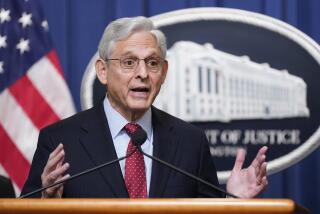Trayvon Martin case, in court
- Share via
In announcing that she was charging George Zimmerman with second-degree murder in the death of Trayvon Martin, special prosecutor Angela B. Corey insisted that “we do not prosecute by public pressure or by petition.” That’s an important assurance; the government shouldn’t bring a case except when allegations are backed up by facts and evidence.
On the other hand, Corey wouldn’t even have been in a position to assess the case against the neighborhood watch volunteer had there not been a public outcry about his release the night of the killing after what looked like a slipshod police investigation. It wasn’t “mob justice” for Martin’s family or the activists who came to their aid to insist on further examination of an incident in which an unarmed 17-year-old was killed by a private citizen who reported sighting a “suspicious guy” and apparently disregarded a dispatcher’s advice not to follow him.
Now, however, the cause of “justice for Trayvon” has become a case. In court, public sentiment must be subordinated to the rules of evidence and prosecutors must convince a jury that the defendant is guilty beyond a reasonable doubt. Guided by that standard, jurors will weigh the prosecution’s version of events (which is still to be fleshed out) against Zimmerman’s insistence that he shot Martin in self-defense. Having rightly demanded that authorities take a second look at the circumstances of this tragic encounter, Martin’s champions will have to be patient as the judicial process unfolds. An arrest has been made, charges have been filed and, unless Zimmerman pleads guilty or a judge dismisses the charges before trial, both sides will have their day in court.
That trial will resolve Zimmerman’s legal guilt or innocence to the satisfaction of a jury, even if the verdict is unacceptable to some members of the public — as are many outcomes of politically freighted trials. It may include testimony from witnesses as well as whatever forensic evidence the prosecution has adduced, about which we can now only speculate. And it may shed light on whether Florida’s “stand your ground” law provides defendants with an unfair advantage in homicide prosecutions. All in all, it we hope it will render a fairer verdict than the often unruly court of public opinion.
It’s unrealistic to expect that the filing of charges will silence all those in the blogosphere and elsewhere who claim certitude about exactly what happened the night of Feb. 26 in Sanford, Fla. Some of them are influenced by racial bigotry or political agendas, and they may be immune to pleas for patience or appeals to the reality that the improbable sometimes is true. The prospect of a trial most likely won’t restrain those who have littered the Internet with supposed evidence of Martin’s bad character (such as irrelevant infractions at school) or satisfy those who tell anyone who will listen that it’s obvious Zimmerman wouldn’t have found a white youth in a hoodie suspicious. But as the judicial process gets underway, perhaps those closest to the case may feel it less necessary to offer dueling and speculative accounts of what happened in the still-obscure moments when two men clashed and one took the life of another.
More to Read
A cure for the common opinion
Get thought-provoking perspectives with our weekly newsletter.
You may occasionally receive promotional content from the Los Angeles Times.






